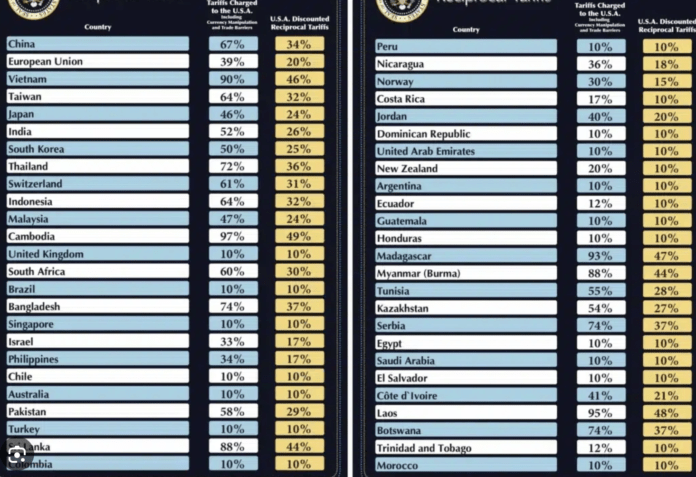
The world economy is confronted with increasing threats of recession, since rates Schaleat and Handelsnions between large economies, warns Nigel Green, CEO of Global Financial Advisory Giant Dover Group.
“World trading volumes shrink at the fastest pace since the 2008 financial crisis. Investors, companies and policy makers have no illusions – a worldwide recession risk is growing every day,” he says.
Recent data to disturbing photo. In the last quarter of 2024, global goods trade has contracted by 1.3% compared to a year earlier, according to the latest figures from World Trade.
At the same time, global production activity continues to decline, with leading indicators that flash red over several regions.
Nigel Green explains: “Rates that are weakened by the world’s greatest economies do not only slow down trade. They erode business confidants, beating business investment plans and ripen by supply chains who had ever driven worldwide growth.
The International Montary Fund (IMF) has already revised STI 2025 Global Growth Forward, stating “increasing trade limitations” as a key factor.
In Adionion, the World Bank has warned that protectionism is in danger of knocking this year alone to the percount of global GDP, which pushes an already vulnerable world economy closer to contraction.
The CEO of Devere Group continues: “It is a dangerous feedback loop. Trade barriers lead to slower growth, which causes political pressure for even more protectionism. We are witnessing the early stages of a combat cycle.”
The costs are starting to bite. Emerging marketsOften the first victims When global trade slows down, see capital outings accelerate. Export assignments fall in advanced economies, the business profits are weakened and the production losses are tapping.
Financial markets are starting to become acquainted. Global stock markets have become more volatile as fears about reducing world trade. In the meantime, currencies from large export countries come under pressure and streams of safe port in assets such as gold and the Swiss francs rise.
“In a mutually interconnected world, trade disruptions quickly run beyond borders,” warns Nigel Green.
“Not an economy is immune. Even those who are less dependent on export will feel that the pain slows down as the investment slows down, the supply chains reconfigver and trust evaporates.”
The risks worse is the political background. Recent movements of the US, China and Europe to draw rates for important imports – from steel and electricity to agricultural products – indicate that the global trade war is not only far from over, but also intellig.
“More than ever, political leaders seem prepared than ever to arm the trade for strategic goals,” I have notes. “But the costs of Tohe movements will ultimately be borne by companies and consumers due to higher prices, lower growth and rising unemployment.”
I continued: “In the 1930s, the world learned painful lessons about the destructive impact of tit-by-for-tat rates. We were used, do well to remember them now.”
Even the rising threats, Green believes that there are still opportunities for investors who are willing to think worldwide and position themselves wisely.
“In times of high risk, critical diversification.
Green is concluded with a call for action: “The warning signals are clear. Those they ignore do this in danger. Investors and companies must now prepare for a laundry of slower global growth, supply chain shifts and geopolitical tensioning increase.
“As the drumbeat of trade wars becomes louder, the world can get a new economic reality – a true resilience, foresight and adaptability become the ultimate successful currency.”
